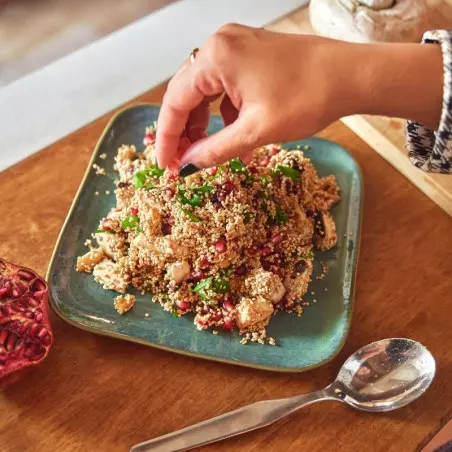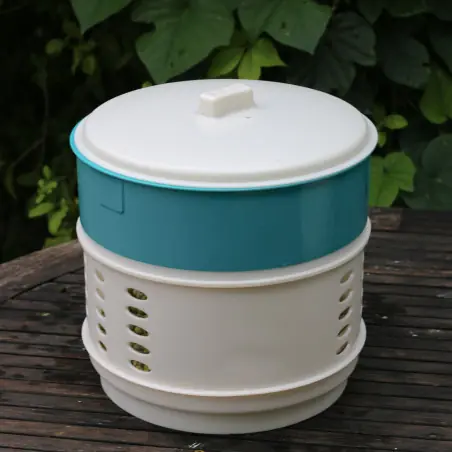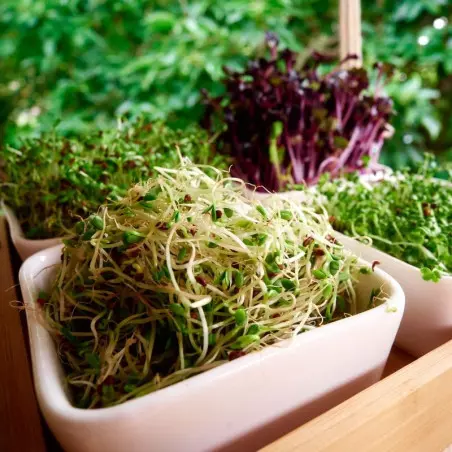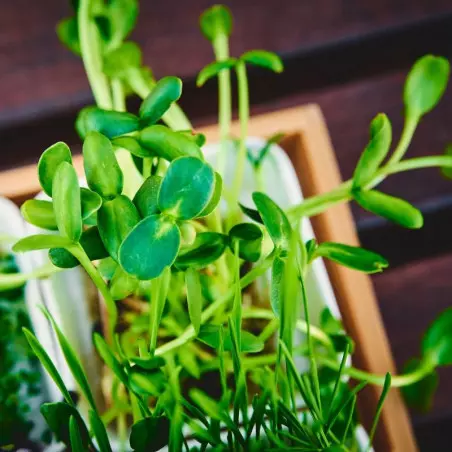In a constantly evolving world, the search for sustainable, nutritious, and easy-to-produce foods is becoming increasingly crucial. The sprouted seeds, long appreciated for their health benefits, emerging today as an interesting solution in the context of survivalism. Let's discover together why these small sproutscan be considered as staple foods and how to incorporate them into our daily lives.
In this article, you will learn:
- the benefits of sprouted seeds for survivalists ;
- how to produce and store sprouted seeds without electricity ;
- the Nutritional benefitsExceptional sprouted seeds ;
- practical tips for incorporating sprouted seeds into your Daily diet.
Sprouted seeds: a major asset for survivalism
In the context of survivalism, Sprouted seeds are a valuable resource due to their ability to be stored for a long time and at their high vitality. These small nutritional marvels, which can last for centuries in dried form, prove to be ideally suited emergency foods for survival situations. They not only have a long shelf life, but their transformation into living sprouts requires neither energy resources nor sophisticated equipment. Their production is simple and does not rely on any technology, which makes them doubly advantageous: Economic and Ecological.
Sprouted seeds, in addition to being easy to produce, offer a food solution of high nutritional quality. They can be considered survival foods that require nothing more than a little water and patience to reveal their full potential. In a world where self-sufficiency and resilience are increasingly sought after, sprouted seeds are positioned as a pillar of sustainable nutrition and Low tech, relegating complex methods to oblivion.
Long-term preservation
Dry seeds are a treasure of longevity when it comes to food preservation. Indeed, when they are properly stored in a dry environment and to the shelter from the light, these seeds can be stored for several years, or even decades. This characteristic makes them an ideal choice for survivalists, always in search of sustainable and reliable food solutions. For comparison, many other survival foods, such as canned goods or dehydrated foods, have a limited shelf life due to report on seedsdry.
The stability of dry seeds is due to their low water content, which prevents the development of mold and bacteria. Additionally, their ability to germinate after long storage periods makes them a high-value food. A simple transformation into sprouted seeds is enough to multiply their nutritional benefitswhile ensuring unparalleled freshness and vitality.
When compared to other emergency foods, dry seeds are a excellent option because they have the advantage of being at both compact and lightweight, thus facilitating their transport and storage. This logistical flexibility, combined with their durability, positions them as a strategic choice for situations requiring food self-sufficiency. Furthermore, their production only requires water, a resource generally accessible even in constrained environments. Through their simplicity and efficiency, they demonstrate that food innovation can simply lie in respecting natural processes.
Easy and economical production
The production of your own seedsprouted is incredibly simple and can be done at home with minimal equipment. This low-tech process is both economical and ecological, making it an ideal solution for those looking to incorporate sustainable and nutritious foods into their diet.
From an economic point of view, the sprouted seeds offer an exceptional cost-benefit ratio. For a few cents, you can produce nutritious sprouts that often surpass fresh vegetables in terms of vitamin contentand minerals. Furthermore, they do not generate any plastic waste and require less water and energy compared to other cultivation methods.
Thus, the Home germination is not only a rewarding activity, but it also allows you to fully control the quality and freshness of the food you consume. In a world where the balance between cost and health is crucial, sprouted seeds prove to be a real boon for those who want a balanced, healthy, and affordable diet.

How to produce sprouted seeds without electricity ?
In a world increasingly focused on sustainability and energy independence, the production of sprouted seeds without electricity is not only possible but extremely effective. These low-tech germination methods are accessible to everyone and adhere to ecological principles while ensuring highly vital foods. These simple techniques require only minimal resources, making them ideal for those who wish to enjoy the benefits of sprouted seeds independently. Let's explore together how you can sprout your seeds at home without using any form of electrical energy.
The Jar Method
The jar method is a simple and accessible technique for sprouting seeds without electricity. It only requires a few basic elements: a glass jar, a Stamen or a piece of fabric Light, and a Elastic. Here is how to proceed:
- Seed selection : Choose seeds to sprout, such as lentils, the Quinoa or the chickpeas. Rinse them thoroughly under cold water to remove impurities.
- Soaking : Rinse them well, then let them soak in water for several hours, usually between 8 and 12 hours. This step rehydrates the seeds and initiates the germination process.
- Drainage : Once this step is completed, drain the seeds and rinse them again.
- Germination : Place them in a jar covered with a cheesecloth or a light fabric, secured with an elastic band. Place the jar at an angle in a drainer, with the opening facing down to allow for drainage. Keep it at room temperature, away from direct light. Rinse and drain the seeds twice a day until they sprout.
Advantages : This method is economical and requires very few resources, making it ideally suited for situations where electricity is not available. It allows for easy monitoring of the seed germinationand total control over the process.
Disadvantages Although simple, this method requires daily attention to rinse and drain the seeds, which can be cumbersome for some people. Additionally, there is a risk of mold if the seeds are not properly rinsed or if the jar is not well-ventilated.
The jar method is therefore a fantastic option for those looking to incorporate sprouted seeds into their diet in a self-sufficient and eco-friendly way. With a little care and attention, you can produce fresh and nutritious sprouts without any energy consumption.
The terracotta sprouter
The terracotta sprouter is a traditional and effective method for germinating your seeds without electricity, while fully adhering to the principles of sustainable and ecological agriculture. This ancient technique uses natural materials that allow optimal humidity regulation, essential for successful germination.
The principle is based on the use of a clay container that absorbs and retains water, creating a slightly humid environment ideal for the growth of sprouts. To begin, you simply need to place your pre-soaked seeds in the sprouter. Water is then added regularly, usually twice a day, to maintain the moisture necessary for germination. The excess water slowly evaporates through the pores of the material, thus preventing stagnation and mold.
This low-tech system, while being simple and economical, offers several advantages. Firstly, it does not require any external energy source, making it perfect for those looking to minimize their ecological footprint. Additionally, the terracotta sprouter offers natural control of humidity and temperature, crucial conditions for maximizing the nutritional potential of sprouted seeds.
However, like any traditional method, the use of terracotta sprouter requires some attention. It is important to monitor humidity levels and ensure that light exposure is adequate to encourage healthy growth. With a bit of practice, this method can become a reliable and rewarding way to produce nutritious sprouts at home.
In conclusion, the terracotta sprouter proves to be an approach that is both environmentally friendly and effective in promoting a nutrient-rich diet. It is a wise choice for anyone committed to a path of food resilience and sustainable health.
Finally, there are other types of Sprouters ecological and autonomous, like the Easygreen Sol sprouter, which do not require any energy source. Although they are extremely convenient and optimize germination, their main drawback remains their slightly higher cost, which can represent a significant initial investment for some.

The Nutritional benefitsExceptional sprouted seeds
Sprouted seeds are often praised for their exceptional nutritional properties, and this, for good reasons. They represent a true explosion of nutrients, often surpassing their non-sprouted counterparts in terms of nutritional value. This natural germination process transforms a sprouted seed into a concentrated source of vitamins, , minerals and living enzymes, thus offering a diet of incomparable richness.
An explosion of nutrients
When the seeds begin to germinate, significant biochemical changes occur. Indeed, germination multiplies the vitamin contents, notably the Vitamin C and And, and B vitamins such as Vitamin B9, , B1 and B2. Studies have shown that the levels of Vitamin C can increase substantially, making sprouted seeds particularly beneficial for strengthening the immune system. Additionally, the availability of minerals such as Iron, the Calcium and the magnesium is also improved, facilitating their absorption by the body.
Germination also acts as an effective method to reduce antinutrients present in seeds, such as phytates, which can interfere with mineral absorption. Thus, not only are sprouted seeds richer in nutrients, but they also allow your body to have a better assimilation.
By incorporating sprouted seeds into your diet, you are choosing a high-density nutritional source capable of meeting the needs of a Lifestyle Active and healthy. For those looking to optimize their health, sprouts are a crucial addition, supported by scientific research that continues to confirm their benefits.
Living enzymes for better digestion
The sprouted seeds are distinguished not only by their richness in vitamins and minerals but also by their content in enzymes living, which play a crucial role in improving digestion. Enzymes are essential natural proteins that facilitate biochemical reactions in our body, including the breakdown of food into easily absorbable nutrients.
When you consume sprouted seeds, you benefit from an abundant source of active enzymes that contribute to a digestive process more effective. These enzymes allow for the rapid breakdown of carbohydrates, proteins, and fats, thereby reducing the workload of your digestive system. This can be particularly beneficial for people suffering from digestive troublesor wishing to improve their gut health. By facilitating the breakdown of food, enzymes reduce undigested residues in the intestine, thus preventing excessive fermentation and indirectly supporting the balance of the gut flora. . By improving the digestion of nutrients, the living enzymes in sprouted seeds also promote better overall health and strengthening of the immune system.
The sprouted seeds are rich in dietary fibers, which makes it an excellent choice for supporting healthy digestion and improving gut health. Sprouting increases the content of soluble and insoluble fibers by report on seedsdishes. Incorporate sprouted seeds into your daily diet can therefore be an excellent strategy to enrich your diet with natural enzymes and keep your digestive system in top shape.
To further explore the role of enzymes, check out our detailed articles: What is an enzyme? Definition and What is the role of enzymes in digestion ?

Incorporate sprouted seeds into your daily diet
Sprouted seeds, with their impressive nutritional profile and simple preparation, are a valuable addition to any diet. These It seems like your message is incomplete. Could you please provide the full text you would like translated?Young shoots are brimming with benefits and can be easily incorporated into many dishes, bringing both flavor and nutrition. For those new to sprouted seeds, understanding how to use them in daily cooking can transform your diet into a source of vitality and well-being.
Simple and delicious recipes
Sprouted seeds are a versatile addition to your kitchen, offering endless possibilities for creating dishes for araw food and delicious that are full of nutrients. Here are some ideas to integrate these superfoods in your daily meals in a simple and delicious way.
Colorful salad with sprouted seeds
- Start with a base of crunchy lettuce.
- Add slices of carrots, cucumbers, and a few slices of radishes.
- Sprinkle everything with sprouted chickpea seeds for extra crunch and drizzle with a dressing made from olive oil, orhemp oil, with lemon and whole grain mustard.
This salad requires no cooking and brings a vibrant freshness to your plate.
Revitalizing green smoothie
- In a blender, mix a handful of spinach, a banana, a green apple, and a spoonful of sprouted lentil seeds for their sweet flavor.
- Add somecoconut water for a smooth texture.
This smoothie is an excellent way to boost your energy in the morning with a burst of vitamins and minerals.
Vegetable and sprout wraps
- Use lettuce leaves as a base for your wraps.
- Add slices ofLawyer, red peppers, celery sticks, and a generous portion of alfalfa sprouts.
- Season with a little soy sauce for a touch of umami.
These wraps are perfect for a quick and nourishing lunch that requires no cooking.
Sprouted seed pesto
In a food processor, blend sprouted sunflower seeds, fresh basil, garlic, lemon juice, and olive oil.
Use this pesto to accompany your raw vegetables or as a spread on raw crackers. This pesto is a creative and nutritious alternative to classic spreads.
To discover more recipes and explore our range of sprouting seeds, visit our selection of sprouted seeds. These recipes show how, with a bit of creativity, sprouted seeds can become a central element of your daily diet, bringing vitality and well-being to every bite.
Storage and consumption tips
Properly storing your sprouted seeds is essential to maximize their freshness and nutritional benefits.s. Once sprouted, it is recommended to rinse them one last time before transferring them to an airtight container. Place this container in the refrigerator to slow down the growth process and prevent spoilage. This method generally allows you to keep your sprouts in perfect condition for four to five days.
To optimize shelf life, ensure that the sprouts are not soaked in water before storing them. A slight moisture is acceptable, but excess water can promote mold growth. Also, remember to regularly check the sprouts and remove any that show signs of wilting or mold.
Regarding the quantities, a small amount is enough to benefit from their advantages. About a handful per day, which is equivalent to 20 to 50 grams, is generally adequate to complete your Nutritional intake Daily. In addition to their high nutritional value, sprouted seeds are light and easy to digest, making them an ideal choice for those looking to enrich their diet in a balanced and healthy way.
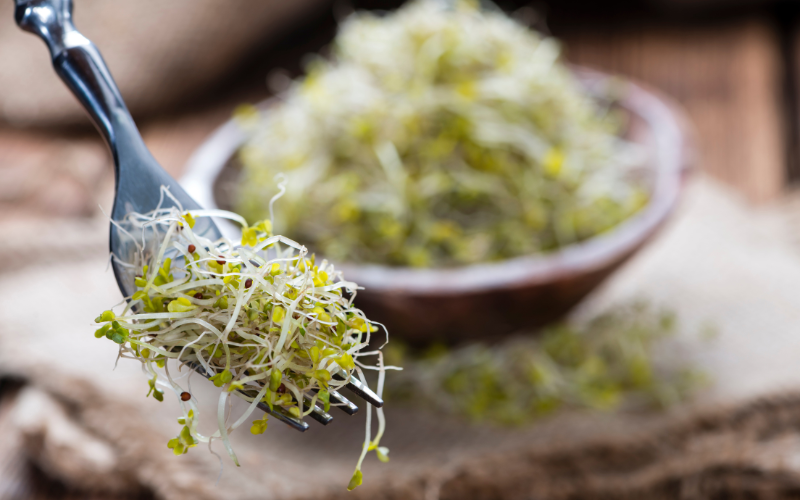
Conclusion
Sprouted seeds are emerging as a wise choice for anyone looking to incorporate high-vitality foods into their daily life while enhancing their food self-sufficiency.. Their ability to be stored for a long time, combined with a nutritional richness exceptional, placing them at the forefront of survival foods and everyday superfoods. By embracing the simplicity of their production, often derived from theorganic farming, and their culinary versatility, everyone can benefit from their advantages while adopting a Lifestyle more sustainable and economical.
Whether you are already a fan of theliving food or if you wish to explore new flavorand avenues towards better health, sprouted seeds offer an accessible and rewarding way to enhance your meals. Feel free to experiment with these small sproutsin your favorite recipes and discover their incredible potential. To continue receiving practical advice and tips on theliving and sustainable food, Subscribe to our newsletter. Together, let's cultivate a healthier and more planet-friendly life.
Your questions and our answers (FAQ)
Why are sprouted seeds considered essential foods for survivalism ?
Sprouted seeds are essential for survivalism due to their long shelf life, high vitality, and ability to be produced without electricity. They offer economical and ecological food solutions that have stood the test of time and are perfect as emergency food supplies.
How can I germinate seeds without using electricity ?
Germination without electricity can be easily achieved using the jar method or the use of a terracotta sprouter. These low-tech methods simply require minimal resources such as a jar, a cheesecloth, and water to produce highly vital sprouts.
What are the nutritional benefits of sprouted seeds ?
Sprouted seeds are a burst of nutrients, often surpassing non-sprouted seeds. They are rich in vitamins C, E, and B, and improve the bioavailability of minerals such as iron, calcium, and magnesium. Sprouting also reduces antinutrients, thereby facilitating the absorption of nutrients by the body.
How to incorporate sprouted seeds into my daily diet ? ?
Sprouted seeds can be easily incorporated into various dishes. Add them to your salads, smoothies, wraps, or use them as a topping for soups. They provide a crunchy texture and a nutritional richness to your meals.
How long can I store my sprouted seeds and how ?
Sprouted seeds can be stored in the refrigerator in an airtight container for four to five days. Make sure they are not soaked in water to prevent mold. Rinse them before storing to maximize their freshness.
Why are sprouted seeds considered ecological and economical ?
Sprouted seeds are environmentally friendly because they require little water and no electricity for their production. They are economical since just a few cents are enough to produce nutritious sprouts at home, thereby reducing the costs associated with purchasing fresh vegetables.



